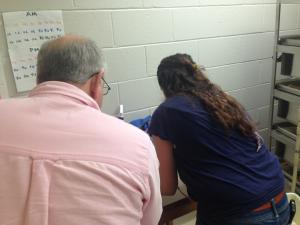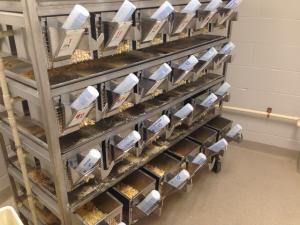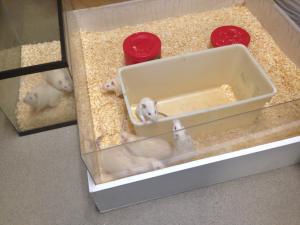Tucked behind a heavy, white door in the Psychology Department at Saint Anselm College is a maze of hallways. Entering the first door, one is bombarded by the clanging sounds of machinery and the squeaking of rats which echo off the walls. Enthusiastic students dart in and out of small rooms, gloved hands gripping syringes and bottles of carefully measured solutions. Here, these students, along with Psychology professor Dr. Joseph Troisi, are using rats as test subjects in a series of experimental research related to drug addiction. Students’ eyes light up when asked about the time they are spending working in the lab. Patrick Conley, a senior Psychology major, says he is particularly interested in using his major for animal research. “Reading an article on this kind of thing is boring, but doing it in person is wicked cool. I think it’s awesome that we have this accessibility to the rats here.” Olivia Koporek, also a senior Psychology major, agrees with Patrick. She says, “Without Dr. Troisi's passion for the research and the Saint Anselm Psychology Department's generation of resources, I find it hard to believe I would have this opportunity at any other college. Many friends I've spoken to who attend other schools, large and small, are not aware of any similar opportunities.” The rats experience counterbalanced, varied states of consciousness - neutral or under the influence of caffeine or nicotine. Under each condition, the rats undergo a form of operant conditioning in which they are reinforced with food pellets by pressing their nose to a lever in their chamber. The twist is this: some “nose touches” are rewarded by food; others are not. Professor Troisi explains that “for some animals, the drug state is used to indicate that their behavior in the operant chambers will be reinforced. For those same animals, the non-drug state is used to indicate that responding won’t be reinforced.” Rats are also tested on days where there are no pellet rewards under either condition. On these test days, a high

er response - a larger number of “nose touches” - is found in rats who experienced the drug condition which was rewarded with a food pellet in the past. A lower response - a smaller number of “nose touches” - is found in rats who experienced the drug condition with no reward in the past. Because the rats experience reward - and lack thereof - in both the drug condition and the non-drug condition, their tendency to “nose touch” for a reward is related to whether they received a reward in the past rather than directly related to how the drug makes them feel. In this way, the tendency toward behavior due to the drug state alone and the tendency toward behavior due to experiencing reward are separated - the drug and the environment become two different factors entirely.

As Professor Troisi notes, “Environmental cues interact with interoceptive cues to regulate behavior - it’s not one or the other. When a person engages in a behavior for taking a drug, they’ve learned a relationship between the emotional state that occurred before it, the behavior that occurred under that state and the reinforcing effect of the drug.” More simply put, focusing solely on extinguishing the behavior of taking the drug is insufficient. What Professor Troisi and his team of students have come to believe is necessary is “extinguishing the behavior in the presence of those cues, but also in the presence of other environmental and internal cues that have no relationship with the drug.” At the same time, it is important to create new habits and behaviors which provide alternative types of reinforcement - rather than drug effects - when those environmental and internal cues are present.

This multitude of valuable, innovative research has incredible translational importance in the arena of drug addiction and related psychological therapy. It is an unfortunate but true fact that drug addiction, in numerous forms, is a continuing problem in our country - even particularly in the city of Manchester. Noelle Michaud, a junior Psychology major, is a newer member to the student team of researchers. She says, poignantly, “A vast majority of people have experience with family or friends being affected by addiction. It is something that will always be relevant because addiction will always exist. This research is a huge contribution to better understand both the psychological and biological processes that come into play for those with an addiction- with the ultimate hope to form effective solutions to extinguish them.” As psychologists, the goal is to examine every element of the issue and target areas to focus on for decreasing its prevalence; this is exactly what Professor Troisi and his team of students have attempted to accomplish in their research. “It’s not just the environment, it’s not just the emotional state, it’s both,” he says. That means working with patients over long periods of time, in multiple contexts, in lots of different situations, and that’s probably the best way to treat drug addiction rather than to treat it just with drug replacement therapy. That’s why we’re studying it.”
